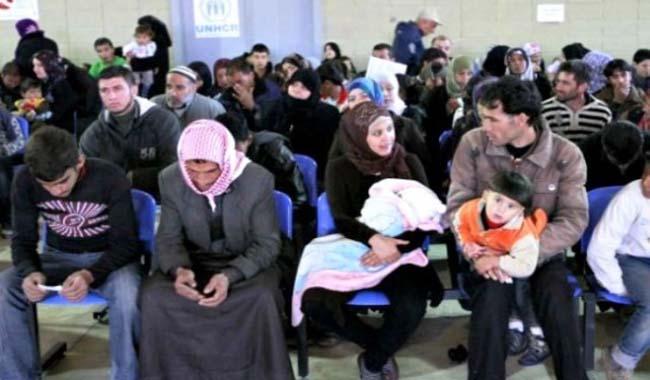NEW YORK: The U.S. State Department
quietly lifted its restriction this week on how many refugees are
allowed to enter the U.S. despite efforts by the Trump administration to
scale back refugee resettlements, The New York Times reported Saturday.
Jennifer Smith, a department official, reportedly notified refugee groups of the decision Thursday in an email stating that they could begin bringing refugees to the U.S. "unconstrained by the weekly quotas that were in place."
Many of the organizations that received the email are private agencies that help guide individuals hoping to enter the country through the two-year U.S. application process.
The number of refugees entering the U.S. could double as a result of the lifted restrictions, refugee advocates told the newspaper.
The leap could go from 830 a week for the first three weeks of May to over 1,500 a week by next month.
While the lifted restriction occurred on the same day that a Virginia-based federal appeals court handed down a ruling that blocked President Donald Trump's travel ban targeting six-majority Muslim countries, the decision is not related to the ruling, the Times said.
Congress passed a spending bill last fall that tightly constrained the budget for the State Department's refugee resettlement programme.
The spending bill passed earlier this month, however, does not impose any limits on refugee admissions.
A State Department spokeswoman told the Times that State consulted with the Justice Department about its refugee quotes before making the decision to adjust them.
Refugee advocates were delighted by the State Departmen's decision.
"This is long overdue, but we'e very happy," Mark Hetfield, president and chief executive of HIAS, an immigrant aid society, said.
But many of the advocates said they were worried that any reprieve would be temporary.
"The president's proposed budget cuts for 2018 would mean we would have a much smaller programme next year no matter what happens with his executive orders," Erol Kekic, executive director of the immigration and refugee program at Church World Service, said.
Perhaps even more worrisome, refugee advocates said they had seen a slowdown in security screenings by the Department of Homeland Security, whose checks are required for refugees to enter the United States.
Still, even Republicans in Congress have said that few of Trump's proposed budget cuts to foreign aid and the State Department's budget would be adopted into law.
In a visit this week to Syrian refugee camps in Turkey, Nikki R. Haley, the United Nations ambassador, all but urged Congress to reverse Trump's proposed cuts in aid to refugees.
Jennifer Smith, a department official, reportedly notified refugee groups of the decision Thursday in an email stating that they could begin bringing refugees to the U.S. "unconstrained by the weekly quotas that were in place."
Many of the organizations that received the email are private agencies that help guide individuals hoping to enter the country through the two-year U.S. application process.
The number of refugees entering the U.S. could double as a result of the lifted restrictions, refugee advocates told the newspaper.
The leap could go from 830 a week for the first three weeks of May to over 1,500 a week by next month.
While the lifted restriction occurred on the same day that a Virginia-based federal appeals court handed down a ruling that blocked President Donald Trump's travel ban targeting six-majority Muslim countries, the decision is not related to the ruling, the Times said.
Congress passed a spending bill last fall that tightly constrained the budget for the State Department's refugee resettlement programme.
The spending bill passed earlier this month, however, does not impose any limits on refugee admissions.
A State Department spokeswoman told the Times that State consulted with the Justice Department about its refugee quotes before making the decision to adjust them.
Refugee advocates were delighted by the State Departmen's decision.
"This is long overdue, but we'e very happy," Mark Hetfield, president and chief executive of HIAS, an immigrant aid society, said.
But many of the advocates said they were worried that any reprieve would be temporary.
"The president's proposed budget cuts for 2018 would mean we would have a much smaller programme next year no matter what happens with his executive orders," Erol Kekic, executive director of the immigration and refugee program at Church World Service, said.
Perhaps even more worrisome, refugee advocates said they had seen a slowdown in security screenings by the Department of Homeland Security, whose checks are required for refugees to enter the United States.
Still, even Republicans in Congress have said that few of Trump's proposed budget cuts to foreign aid and the State Department's budget would be adopted into law.
In a visit this week to Syrian refugee camps in Turkey, Nikki R. Haley, the United Nations ambassador, all but urged Congress to reverse Trump's proposed cuts in aid to refugees.

No comments:
Post a Comment